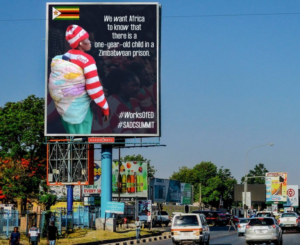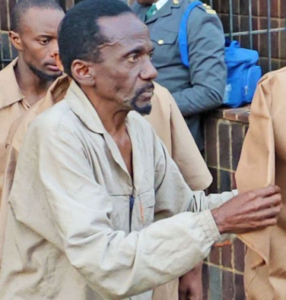JACOB NGARIVHUME’S SENTENCE: A THREAT TO DEMOCRACY IN ZIMBABWE

The recent decision to incarcerate opposition leader Jacob Ngarivhume for 48 months, on the grounds of inciting public unrest, highlights his use of free speech and peaceful gathering. This shows a growing attack against voices of dissent. Vongai Chikwanda, the acting Deputy Director for Southern Africa at Amnesty International, shared her concern about this issue.
Jacob Ngarivhume now faces four years in prison, with a quarter of the term suspended. This is due to his role in organizing and leading a non-violent protest in July 2020. The protest was against corruption and the lack of socio-economic rights for Zimbabwe’s people. It is shocking that Ngarivhume faces such a punishment for using his rights to free speech and peaceful assembly – rights that are in the country’s constitution.It is urgent for authorities to reconsider and cancel this punishment. The sentencing of Ngarivhume appears to be a strategy to suppress opposition, using the judicial system to intimidate and silence dissenting voices.
Jacob Ngarivhume’s conviction and sentencing show a growing suppression of opposition leaders, human rights advocates, activists, journalists, and others who dare to speak out. This trend raises concerns about the misuse of legal systems. It is clear that authorities are using the law to target opposition figures and those who speak against corruption.
The charges against Ngarivhume show the lengths authorities are willing to go to silence dissent. They are targeting individuals who use their constitutional rights. This is a worrying sign of democratic erosion in Zimbabwe, where freedom of expression and assembly, key parts of a democratic society, are being harshly suppressed.
The heavy sentence against Ngarivhume is a chilling reminder of the cost of speaking out against corruption and injustice in the country. The use of state power to silence opposition voices is a troubling trend that threatens democracy in Zimbabwe. Amnesty International’s call to quash this sentence is a call for justice, for protecting freedom of expression, and for respecting individual rights.
In a society where the rule of law should be supreme, the use of legal systems to punish opposition voices is a shocking betrayal of democratic principles. It is a clear reminder of the need for constant vigilance against the abuse of power, especially when that power is used to silence voices that seek to expose corruption and demand justice.
The situation is a pressing wake-up call for international observers and allies of democracy to look more closely at the Zimbabwean government’s practices. These practices show a serious disregard for basic human rights, especially freedom of expression and peaceful assembly, which are tools for promoting transparency and accountability.
The conviction and sentencing of Jacob Ngarivhume are part of a broader, growing crackdown on opposition figures, human rights defenders, and critical voices in Zimbabwe. It is a chilling reminder of the lengths authorities will go to silence those who speak out against corruption and injustice. It calls for urgent action from local and international bodies to protect fundamental human rights and democratic values.
In conclusion, the decision to imprison Jacob Ngarivhume for exercising his right to free speech and peaceful assembly is a direct attack on democracy in Zimbabwe. It highlights the need for strong, immediate action to protect these essential rights and to ensure that the voices of dissent are heard and respected. The international community must stand together in condemning this unjust sentence and supporting the fight for freedom and justice in Zimbabwe.



